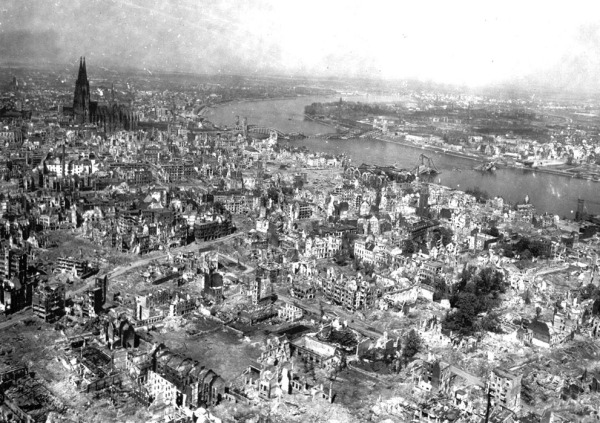 It is widely believed to this day that the Germans instigated the aerial bombing campaign against European and British cities, and thus “got what they deserved” in kind. Often cited are the German bombings of Warsaw and Rotterdam. These two instances of bombings are not in dispute, however, the context must be considered. The details are seldom discussed, and hence, little known. The rules of warfare must also be considered. The deliberate targeting of civilians was indeed a “war crime”. The Hague conventions tolerated the bombing of cities IF they were under military occupation (ie “defended”), which was the case with both Warsaw or Rotterdam.
It is widely believed to this day that the Germans instigated the aerial bombing campaign against European and British cities, and thus “got what they deserved” in kind. Often cited are the German bombings of Warsaw and Rotterdam. These two instances of bombings are not in dispute, however, the context must be considered. The details are seldom discussed, and hence, little known. The rules of warfare must also be considered. The deliberate targeting of civilians was indeed a “war crime”. The Hague conventions tolerated the bombing of cities IF they were under military occupation (ie “defended”), which was the case with both Warsaw or Rotterdam.
The Hague Conventions for Land Warfare (which Germany was a signatory to) stated:
Article 25
The attack or bombardment of towns, villages, habitations or buildings which are not defended, is prohibited.
Article 26
The Commander of an attacking force, before commencing a bombardment, except in the case of an assault, should do all he can to warn the authorities.
Article 27
In sieges and bombardments all necessary steps should be taken to spare as far as possible edifices devoted to religion, art, science, and charity, hospitals, and places where the sick and wounded are collected, provided they are not used at the same time for military purposes.The besieged should indicate these buildings or places by some particular and visible signs, which should previously be notified to the assailants.
In the cases of both Warsaw and Rotterdam, the bombing was not intentionally to target civilians. Indeed, Hitler had long campaigned against such actions in warfare and at the commencement of hostilities with Poland, he gave explicit orders to the Luftwaffe to not target civilians, and they adhered strictly to this order. In Warsaw, however, the Polish army retreated into the city and turned it into fortress. In essence, they took the city and the population as a hostage. They were given several ultimatums to surrender, with reasonable time to do so, but they refused. Flyers were also dropped from the air to warn civilians of the imminent danger. All prudent measures were taken. While civilians indeed died, they were not intentionally targeted. The aim of the bombing was to force a surrender of the Polish forces which were holed up there. That was not, according to the international law, a “war crime”. Here, one may also question why Hitler felt compelled to attack Poland in the first place. I have covered this in numerous past posts, however, to understand this fully, I recommend reading:
100 Documents on the Origin of the War (German White Book) pdf
The situation in Rotterdam was very similar. A group of Dutch resistance fighters that fought at the Grebbeberg took refuge in Rotterdam. This eventually resulted in a German ultimatum that if the Grebbeberg resistance did not cease, Rotterdam would be bombed. The resisters finally complied and the bombing raid was to called off at the last minute. However, there was a communications problem. Ground flares intended to call off the attack were not seen or by one of the inbound bomber formations and Rotterdam was thus inadvertently bombed. About 900 people died and 80,000 people became homeless as a result of ensuing fires which were NOT caused by incendiaries, but rather, by hazardous materials stored on the ground. Mainstream history confirms that:
“Student radioed to postpone the planned attack. When the message reached KG 54’s command post, the Kommodore, Oberst Walter Lackner, was already approaching Rotterdam and his aircraft had reeled in their long-range aerials. Haze and smoke obscured the target; to ensure that Dutch defences were hit Lackner brought his formation down to 2,300 ft (700 m).[27] German forces on the Noordereiland fired flares[28] to prevent friendly fire — after three aircraft of the southern formation had already unloaded, the remaining 24 from the southern bomber formation under Oberstleutnant Otto Höhne aborted their attack. The larger formation came from the north-east, out of position to spot red flares launched from the south side of the city, and proceeded with their attack. Fifty-four He 111s dropped low to release 97 tonnes (213,848 lb) of bombs, mostly in the heart of the city.[29]
Why the formation had not received the abort order sooner remains controversial. Oberst Lackner of the largest formation claimed that his crews were unable to spot red flares due to bad visibility caused by humidity and dense smoke of burning constructions and subsequently needed to decrease altitude to 2,000 feet.[30] But the red flare, which Lackner failed to see, might have also been used by the Germans to show their location in the city to avoid friendly fire. An official German form designated red as the colour for that purpose.[31]”
While the details of what actually happened versus what was supposed to happen (or not happen) remain somewhat sketchy, it was clearly a military vs military attack, and not intended to deliberately target the civilian population of Rotterdam. This, however, will inevitably beg the question “why did the Germans invade peaceful, neutral Holland? Surely they had no right to do so!” This question must be answered with another question. Why did the neutral Dutch permit the RAF to use its airspace to attack the German cities of the Ruhr Valley? Why did they not defend their stated neutrality? The German White Book Nr.8 – The Sole Responsibility of England for the Bombing War (1943) indicates numerous instances of British bombers attacking German cities in the Ruhr from the direction of neutral Belgium and Holland. To my knowledge, this book is not available in an English translation.
Weissbuch_Nr.8_Alleinschuld_England
Indeed, the British Expeditionary Force planned to attack Germany through these countries, which were apparently not opposed, while still maintaining their declaration of neutrality. Germany was therefore not obliged to respect their proclaimed neutrality in defence of its own sovereign territory.
It must also be noted that Germany did not bomb the city of Paris (or other major French cities). Why not? Because the French declared them to be “free cities”. In other words not occupied by the French military or “not defended”. Thus they and their cultural artifacts, architecture etc were protected and would not be bombed by the Luftwaffe. That, however, did not dissuade the British and Americans from bombing Paris and other French cities later, thereby destroying cultural artifacts and killing many thousands of French civilians in the name of “liberation”.
The British bombing of German cities started well before Churchill even became Prime Minister, on Sept. 5th, 1939 at Wilhelmshaven. Then resumed again with ferocious intensity in the Spring of 1940 and increased with the advent of the unelected Churchill’s rise to power.
“On 3 September 1939 the French and British empires had declared war on Germany and England’s Royal Air Force began attacking German warships along the German coast with the North Sea. The attacks by the Royal Air Force (RAF) on German cities began with the attack on Wilhelmshaven on 5 September 1939. Eight months later, on the 9th of May 1940 began the German offensive in the West. On the 11th of May the British Cabinet decided to unleash the Bomber Command on the air war against the German hinterland. The following night British planes aimlessly dropped bombs for the first time on residential areas of Mönchengladbach-Rheydt. And from then on made such attacks on cities in the Ruhr area night after night. Up to the 13th of May 1940, i.e. two days later, the German side registered a total of 51 British air attacks on non-military targets plus 14 attacks on military targets such as bridges, railway tracks, defense and industrial plants.The first carpet bombing of a German city was in the night of the 15th to 16th of May 1940 in Duisburg. After that the RAF committed repeated air attacks on German cities. The night of the 24th of August 1940 – bombs meant to be dropped on the Thameshaven oil storage depot and on the Short’s factory at Rochester, by mistake or simply because they were randomly unloaded in order to escape fighters, fell on the City of London and nine other districts inside the Greater London area. Incendiaries lit fires in Bethnal Green, and St.Giles’ Church in Cripplegate was damaged. Oxford Street department stores were damaged. Nine people were killed and 58 injured. On the 25th of August 1940, British bombers attacked Berlin by night, and indeed not even to target important military targets, because the Royal Airforce (RAF) was not even capable, having not developed any bomb-targeting devices. On the 6th to the 7th of September 1940, a German air raid on London took place – but specifically on military targets such as ports, railway stations, war factories and power stations. Crews were expressly prohibited to drop their bombs on residential areas, because thereby, no ‘war deciding’ successes could be expected.”
http://www.scribd.com/doc/87187334/Churchill-the-Warmonger-Started-the-Bombing-on-Cities-First (includes the German text, although I am still looking for the original source. I have contacted the person who posted this for his assistance and am awaiting a reply. I will update this post if and when I receive the requested info).
Regarding England, the fact is, that Germany endured a solid 5 months of bombing of its cities and civilians before responding in kind. The city of Coventry endured a mere 380 dead. While regrettable, that was absolutely minuscule in comparison to the bombing of hundreds of German cities and towns, and the casualties which the German side endured by this unprovoked, criminal British policy of targeting civilians.
For those who read German, I also recommend reading:
ERICH KERN. Verbrechen am deutschen Volk. Eine Dokumentation alliierter Grausamkeiten. 1964. VERLAG K. W. SCHÜTZ • GÖTTINGEN
Kern__Erich_-_Verbrechen_am_deutschen_Volk (pdf)
More to come on this topic.



